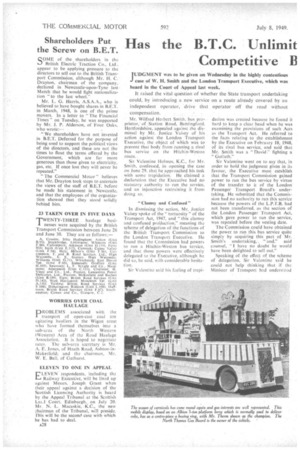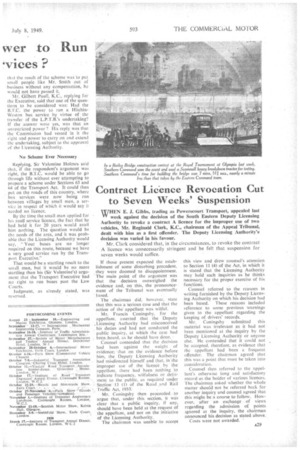Has the B.T.C. Unlimit
Page 4

Page 5

If you've noticed an error in this article please click here to report it so we can fix it.
wer to Run
Competitive 13
*vices ?
TUDGMENT was to be given on Wednesday in the highly contentious case of W. H. Smith and the London Transport Executive, which was heard in the Court of Appeal last week.
It raised the vital question of whether the State transport undertaking could, by introducing a new service on a route already covered by an independent operator, drive that operator off the road without compensation.
Mr. Wilfred Heibert Smith. bus proprietor,' of Station Road, Buntingford, Hertfordshire, appealed against the dismissal by Mr. Justice Vaisey of his action against the London Transport Executive, the object of which was to prevent thatbody from. running a rival bus service on the Hitchin-Weston route..
Sir Valentine Holmes, K.C., for Mr. Smith. confessed, in -opening the ease On June 29. that he approached his task with sonic trepidation. He claimed a declaration that the Executive had no statutory authority to run the service, and an injunction restraining it from doing so.
"Clumsy and Confused" In dismissing the action, Mr. Justice Vaisey spoke of the "tortuosity" of the Transport Act, 1947, and " this clumsy and confused prauction," meaning the scheme of delegation of the functions of the British Transport Commission to the London Transport Executive. He found that the Commission had powers to run a Hitchin-Weston bus service, and that those powers were effectively delegated to the Executive, although he did su, he said, with considerable hesitation.
Sir Valentine said his feeling of trepi
dation was created because he found it hard to keep a clear head when he was examining the provisions of such Acts as the Transport Act. He referred to the facts relating to the establishment by the Executive on February 18, 1948, of its rival bus service, and said that Mr. Smith was a "David:' fighting a "Goliath."
Sir Valentine went on to say that, in order to hold the judgment given in its favour, the Executive must establish that the Transport Commission gained power to run the bus service by virtue of the transfer to it of the London' Passenger Transport Board's. undertaking. He submitted that the Commission had no authority to run this service because the powers of the L.P.T.B. had not been transferred, as the section of the London Passenger Transport Act, which gave power to run the service, was repealed before the vesting date.
The Commission could have obtained the power to run this bus service quite simply by acquiring this part of Mr. Smith's undertaking„ "and," said counsel, "I have no doubt he would have been delighted to sell out."
Speaking of the effect of the scheme of delegation, Sir Valentine said he could not help thinking that if the Minister of Transport had understood that the result of the scheme was to put small people like Mr. Smith out of business without any compensation, he would not have passed it.
Mr. Gilbert Paull, K.C., replying for the Executive; said that one of the questions to be considered was: Had the B.T.C. the power to run a HitchinWeston bus service by virtue of the transfer of the L.P.T.B.'s undertaking? If the answer were yes, was that an unrestricted power ? His reply was that the -Commission had vested in it the right and power to carry on and extend the undertaking, subject to the approval of the licensing Authority.
No Scheme Ever Necessary Replying, Sir Valentine Holmes said that, if the respondent's argument was right, the B.T.C. would be able to go through life without ever attempting to prepare a scheme under Sections 63 and 64 of the Transport Act. It could then put on the roads of this country, where bus services were now being run between villages by small men, a service in respect of which it would say it needed no licence.
By the time the small man applied for his matt service licence, the fact that he had held it for 20 years would avail him nothing. The question would be the needs of the area, and it was probable that the Licensing Authority would say, "Your buses are no longer required on this route, because we have a very good service run by the Transport Executive."
That would be a startling result to the small man, but -it would be no more startling than his -(Sir Valentine's) argument that the Transport Executive had no right to run buses past the Law Courts,
Judgment, as already stated, was reserved,


























